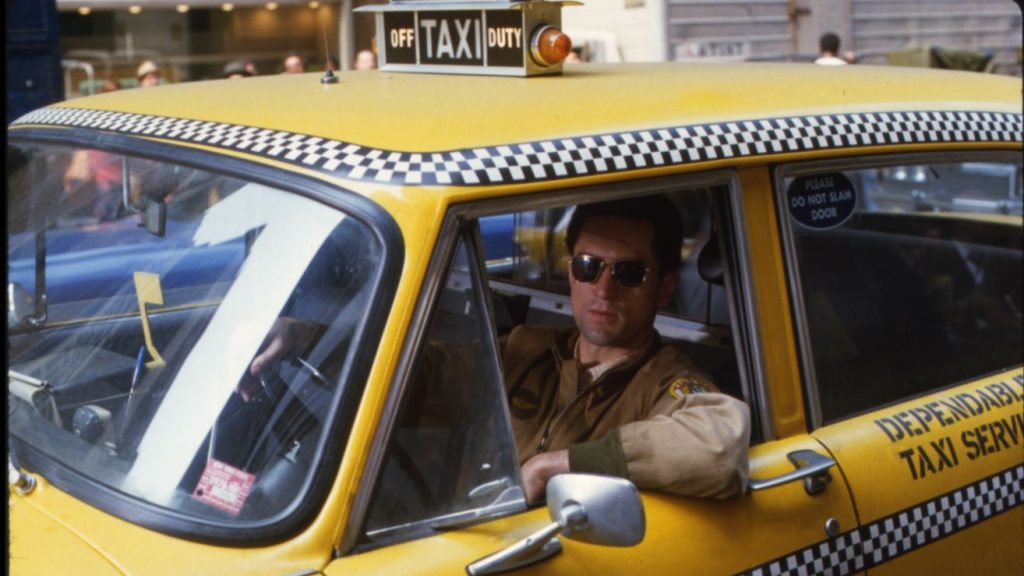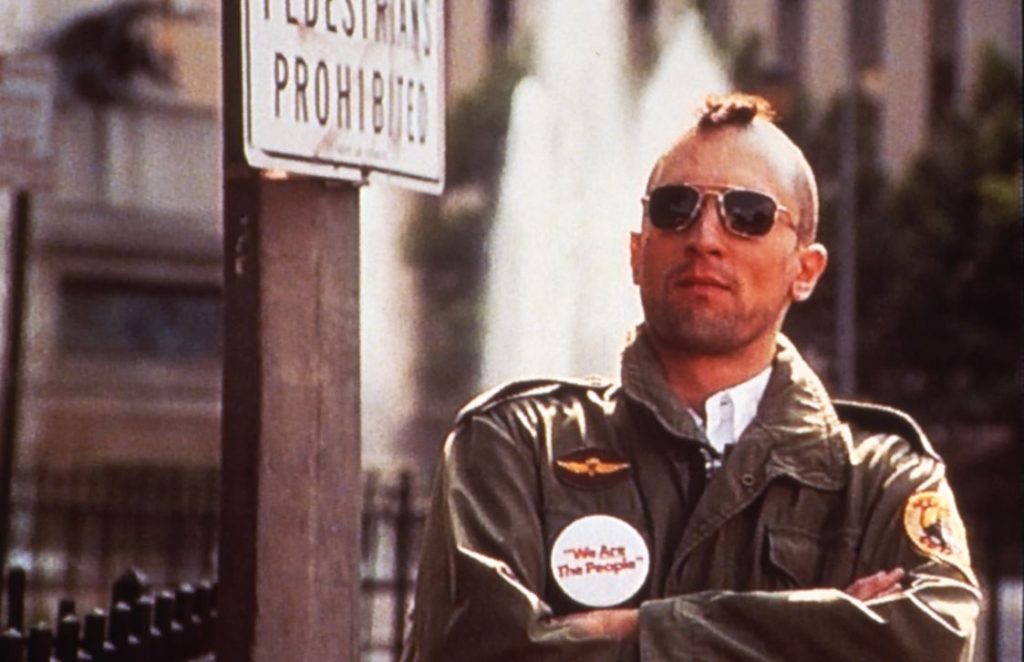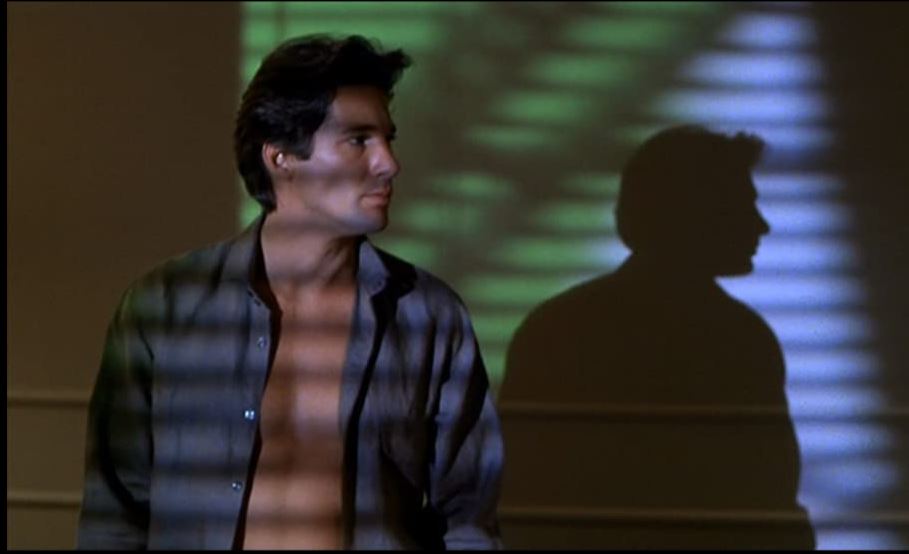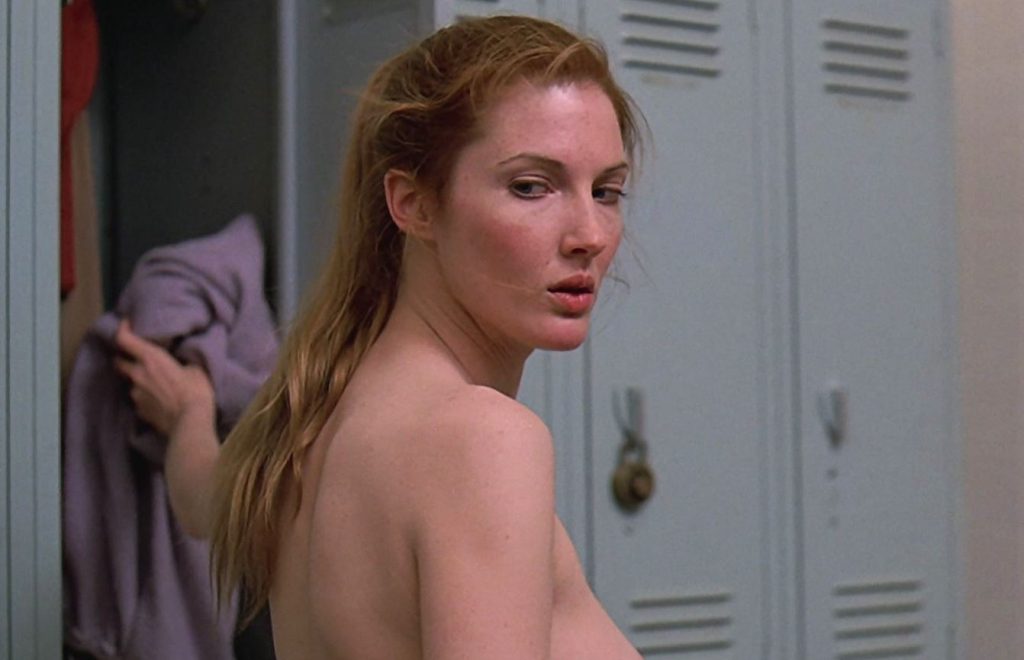
Men Gotta Have Fun
I’ve always believed religion fucks you up and thank God it did just that to Paul Schrader. Raised in a strict Calvinist household, he famously didn’t get to see a movie until his late teens. No matter, because once he dipped an intellectual, alienated toe into the celluloid pool the floodgates opened. Not long afterward he was penning legendary scripts like Taxi Driver and making his directing debut with 1978’s excellent Blue Collar. Specializing in existential angst and simmering male misfits on the verge of violence, he has remained a prolific contributor to cinema for nearly half a century.
Men with a death wish: Taxi Driver (1976) and Rolling Thunder (1977)
Schrader’s first two scripts, The Yakuza and Obsession, were heavily fucked about with, giving him firsthand experience of how little power a novice writer has within the industry. Then he hooked up with Scorsese, a director who had the balls to be faithful to the power of his dark visions. The result was cinematic glory for both.
In the decent doco Easy Riders, Raging Bulls, which explores the rise of Hollywood’s studio-challenging filmmakers between 1969 and 1980, Schrader explains Taxi Driver’s origins. “I was in debt, I wasn’t making any money, my marriage had fallen apart… I didn’t have much of a place to go or much of a life. I took to wandering and kind of drifting around. And it was out of that period of drifting and drinking that I started having this pain and I went to the hospital and had an ulcer. Twenty-six years old. I realized in the emergency area I hadn’t spoken to anyone in weeks. I just drifted around in this car, sleeping in it, and so the metaphor of the taxi driver came to me.”
And what metaphor is this? Essentially, the taxi cab as a mobile coffin, driven by a dead man who’s interacting and functioning yet continually alone and falling apart. You can debate how much of a stand-in Travis Bickle is for Schrader himself, but there can be little doubt of the parallels between the two. This naked honesty (along with inspiration he took from studying the diary of a real-life would-be assassin) enabled Schrader to produce one of the 20th century’s greatest screenplays. Taxi Driver has since set in stone a host of traits for all those budding psychos that popped up in Bickle’s wake: pumping iron, diary keeping, awkwardness with women, acting out in front of the mirror, an altered hairdo, delusions of importance (“the sensitive nature of my work for the government demands the utmost secrecy”), self-pity (“I’m God’s lonely man”) and fatalism (“My whole life has pointed in one direction. There never has been any choice.”)

Schrader’s misanthropy-soaked script, though, is careful not to concentrate on Bickle alone. Indeed, Taxi Driver boasts a rich array of supporting characters in its fully realized world, such as Easy Andy the gun salesman (Steven Prince), the loathsome Sport (Harvey Keitel), the badly dressed child hooker Iris (Jodie Foster) and the warm, wisecracking political campaigner (Albert Brooks).
However, it’s Bickle who dominates virtually every scene. Schrader captures his diseased personality instantly. We see a workaholic existing on a diet of shit. This is a racist, inarticulate freak who sits alongside other silent misfits in a porno theatre after he’s finished cleaning cum and blood off his taxi’s backseat. He’s drowning in loneliness and can only think in extremes. Betsy (Cybill Shepherd) is the first female he fixates on, seeing her as an angel floating above New York’s scum-filled streets. Or as he muses: “They… cannot… touch… her.” But such idealization can never last and it isn’t long before the possibility of salvation has disappeared and he’s publicly yelling at her: “You’re in a hell and you’re gonna die in a hell like the rest of ’em!” Like the stinking thinking of so many mass murderers, he’s caught in that curious contradiction of being convinced of his superiority yet unable to demonstrate one iota of it. What’s left but to orchestrate a bloodbath? At least violence is a way of being noticed, of making that long-cherished contact with the rest of the human race.
The truth is that all along Bickle has wanted to put a gun in his mouth. He hasn’t so far because it chafes against his misplaced sense of pre-eminence. Instead, he half-grasps he has to do something extreme, some excessive act that will provide the trigger to act on his intense desire for self-annihilation. Anything will do, whether assassinating a public figure or ‘saving’ an underage girl from her criminal abusers, because once that line has been crossed there’s even less point to living. His death wish is shown when his murder spree ends with him trying to blow his head off, defeated by an empty chamber.
As for its much-discussed coda, I see it as one long fantasy in which the dying Bickle imagines the newspapers declaring him a hero and Iris’ parents penning a gushing letter of thanks. Then the elusive, angelic Betsy gets into his cab, obviously awed by his scum-eradicating presence as he plays it cool. To take such events literally is surely a mistake as that would give Schrader’s creative masterpiece a pat resolution and I’m not having that.
Rolling Thunder is nowhere near as well known or influential as Taxi Driver but often feels like a companion piece, especially during its similarly violent house of sin shootout. It was rewritten much to Schrader’s chagrin, but unlike the slow, odd Obsession still seems to have been penned by our man. This is because its main character Major Charles Rane (William Devane) shares a lot in common with Bickle. He’s also a Vietnam vet, a reticent, adrift insomniac who works out. The war gave Kane a much tougher time, though, resulting in years of imprisonment and torture. It’s no wonder he (and his similarly traumatized buddy Tommy Lee Jones) both act like automatons during their homecoming. Readjustment to an America they barely recognize proves impossible, partly because Kane’s young son doesn’t even remember him while his wife is heavily involved with another man. Bickle liked to burn his hand over the stove, but Kane prefers re-enacting a VC torture session with his cuckold. This sense of masochism is reinforced when he refuses to cooperate with a bunch of home invaders, resulting in the loss of a hand. Before he goes after them, he puts on his army uniform, suggesting he’s restaging the war and that violence creates repetitive patterns.
The excellent Devane gives a still, tightly wound performance. He’s like a man in a room trapped by his spiraling thoughts. Throughout Rolling Thunder there are plenty of signs he died some time ago and just wants a burial. When he hears a song on the radio, he comments: “I remember that song from when I was alive.” Later he says: “It’s like my eyes are open and I’m looking at you, but I’m dead. They’ve pulled out whatever was inside of me.” A new woman comes into his life but her love can neither save him nor alter his imminent violence. “You know,” she tells him, “You don’t have to do any of this. You don’t have to go after these guys. We could just jump in the car and go a thousand miles from here and nobody would know any difference. Bury the guns in the desert.” She gets no response because Kane (like Bickle) feels he has no choice. The only escape is to enter a tunnel that hopefully leads to a ghastly form of redemptive darkness or better still, obliteration.

Sexy stuff: Hardcore (1979), American Gigolo (1980), Cat People (1982) & The Canyons (2013)
In quick succession Schrader put together a trio of flicks built on somewhat unhealthy sex, but failed to score even a solitary bull’s eye. They’re still important watches to get a handle on the guy, though. The less said about his final effort, The Canyons, the better.
First up was Hardcore, a neo-noir drama about a bewildered Calvinist (based on Schrader’s dad!) trying to fish his wayward teenage daughter out of the world of porn. With Schrader in charge of a self-penned script and George C. Scott anchoring the movie, it should’ve been a grimy classic.
Instead, it gets my vote as the most disappointing entry in Schrader’s body of work. Goddamn it, how did he mess up such fascinating subject matter? Just compare its start to Taxi Driver. In Scorsese’s flick the tone is captured straightaway by a yellow cab ominously bursting through a cloud of steam to Bernard Hermann’s legendary score, but Hardcore offers a bunch of kids playing in the snow as a country and western singer warbles over the top. Hmm, all right, we’re in the deadly dull Midwest, but things remain a little ‘off’ all the way through.
Jake Van Dorn (Scott) is a successful Michigan businessman whose virginal daughter happily toddles off to California for a religious convention. He appears to be a decent, likable guy, but Schrader does a poor job in building up their relationship. They don’t even have a conversation before she disappears, giving us no explanation why she swaps a secure and loving home for fucking strangers on camera thousands of miles away. This must be deliberate on Schrader’s behalf. Perhaps he’s trying to say you never know what’s going on in somebody’s head, even if they’re blood. Still, the decision to neither flesh out the relationship nor offer the slightest reason for the daughter’s impulsive decision to become a sucky-fucky collection of orifices does make Hardcore feel like it’s built on cum-spattered sand.
Van Dorn’s a dull character, resolutely untempted by the array of overripe, half-rotten fruits that litter his path. Frustratingly, Hardcore doesn’t manage to do much with his religion, either. At one point a churchy friend tells him: “Sometimes it’s hard to understand the Lord’s ways. He’s testing you. You have to have faith.” Van Dorn doesn’t even start to contest this placatory crap, even though it appears his mate is suggesting it’s all right for God to drop a wholesome young woman up to her little titties in smut simply so her dazed dad can pass some sort of celestial entrance exam in the future.

Hardcore also introduces a sketchy super-villain far too late, is full of ropey performances, and never gets anywhere near Taxi Driver’s epic sleaziness. The whole thing lacks teeth and isn’t much better than the dreadful Nic Cage vehicle, 8mm. Yes, there’s some amusement to be had as the conventionally dressed, teetotal ‘pilgrim’ Van Dorn prowls L.A.’s sordid streets, but things lurch into absurdity when he slips on a wig, gold necklace and tash to pose as a porn producer. Mind you, at least this gives us the chance to meet Big Dick Blaque (Hal Williams). “I can cum ten times a day,” he boasts during his audition. “I can keep it hard for two hours at a time. I’m a woman’s dream. I got a dick hung on me nine inches long.” Ah, the confidence and arrogance of youth. Indeed, I remember trotting out much the same stuff to one of my junior school teachers.
American Gigolo is another glum, action-light pic, although at least it rang the box-office bell. It was initially perceived as a Travolta vehicle before being hilariously offered to Chevy Chase. Instead Richard Gere took on the mantle, establishing himself as a star in the process. Gere’s not a fave and I’d argue his career has been a disappointment, but I always enjoy his Officer and a Gentleman turn. However, he’s well-cast here and deserves some sort of plaudit for being brave enough (unlike George C. Scott) to get his cock out. There’s not much else to applaud, though. For the most part American Gigolo plays like a dour flip version of Pretty Woman in which a gorgeous male hooker is in control, living the life and never once dealing with the hideous realities of genitalia-selling night after night.
Gere is Julian Kay, a hollow, blatantly narcissistic Patrick Bateman forerunner lacking the murderous violence. He’s a preening prick who likes cruising around L.A. in an open-top Merc to the groovy sound of Blondie, lounging in an upmarket cafe sipping Perrier while clad in Armani and giving the ladies the eye or just being half-naked in front of a mirror. He specialises in servicing older women, telling one: “I’m gonna get you wet. Very wet. I know how to do this.”

Ooh, Julian, you smoothie.
Like Hardcore, the suspense-free Gigolo occasionally flickers into life, such as when Gere gets landed with a Palm Springs ‘rough trick’ husband who enjoys watching his wife being banged. “Slap that cunt,” he urges Gere. Suddenly the movie promises to exploit its dark potential, but there’s a persistent feeling Schrader, who wrote and directed, doesn’t have full control of the provocative material. It slips through his fingers, ending up as a languid, near-stillborn experience. Like the main character, it’s all surface, no depth, although I enjoyed the brief sight of Gere on a gay nightclub dance floor surrounded by a bunch of Village People wannabees. Ultimately, though, Gigolo is a duff two hours which left me wishing Chevy Chase had been cast. At least that would’ve been funny.
Schrader tackled horror for the first time with his eroticised update of 1942’s historically important but rather boring Cat People. Thankfully, it’s saucier than Hardcore and Gigolo with the sensuous Nastassja Kinski probably not having been this nudie since her super-naughty, borderline illegal debut in To the Devil a Daughter six years earlier. Cat People has an intriguing start with Bowie crooning the title song over an image of a red desert as the wind gradually uncovers skeletal remains. Schrader segues into a prologue that depicts an ancient tribe leading a young maiden to a dead tree and sacrificing her to a black leopard.

OK, I’m in.
In modern-day New Orleans the virginal Kinski hooks up with her long lost brother (the always wacky Malcolm McDowell) only to find out they’re werecats. Families, eh? Has anyone got a normal one? Being a werecat basically means it’s less hassle to fuck a sibling because if you do it with a non-relative then you have to go through the rigmarole of transformation, slaughter and picking out human flesh from between your teeth. “You can’t escape the nightmare without me,” McDowell tells her, “and I can’t escape without you.” Schrader touched upon incest in Obsession, but it’s a lot more up front here, seasoned with a little bondage and an amusing episode of hooker-mauling.

Cat People is my pick of Schrader’s sexy stuff, although I’d still label it a six out of ten pic. Kinski (and her extraordinary face) is the best thing about it, especially when she starts to accept her feline nature by prowling naked through the undergrowth while alive to the sounds of the night. Elsewhere, her groggy brother gives a good impression of the world’s worst hangover by waking up on the bathroom floor only to stagger into a different room to find his busty casual pickup dismembered. There are a lot of nice visuals in Cat People, aided by Giorgio Moroder’s smooth electronic score and a reasonable attempt at an American Werewolf-type transformation.
Cat People is mostly barmy fun, but the crowdfunded, mysteriously titled The Canyons is another action-light, too talky failure. Its main problem lies with Bret Easton Ellis’ terrible script rather than Schrader’s brightly lit direction or its lead casting of a real-life porn star. No one does vapid, superficial, materialistic arseholes better than Ellis but, American Psycho aside, he usually fails to fit them into a compelling story. Canyons is supposedly erotic and does manage to offer some big tits and swinging dicks, but ends up humourless, dreary and resolutely unsexy. It’s the most critically reviled pic in Schrader’s catalogue.